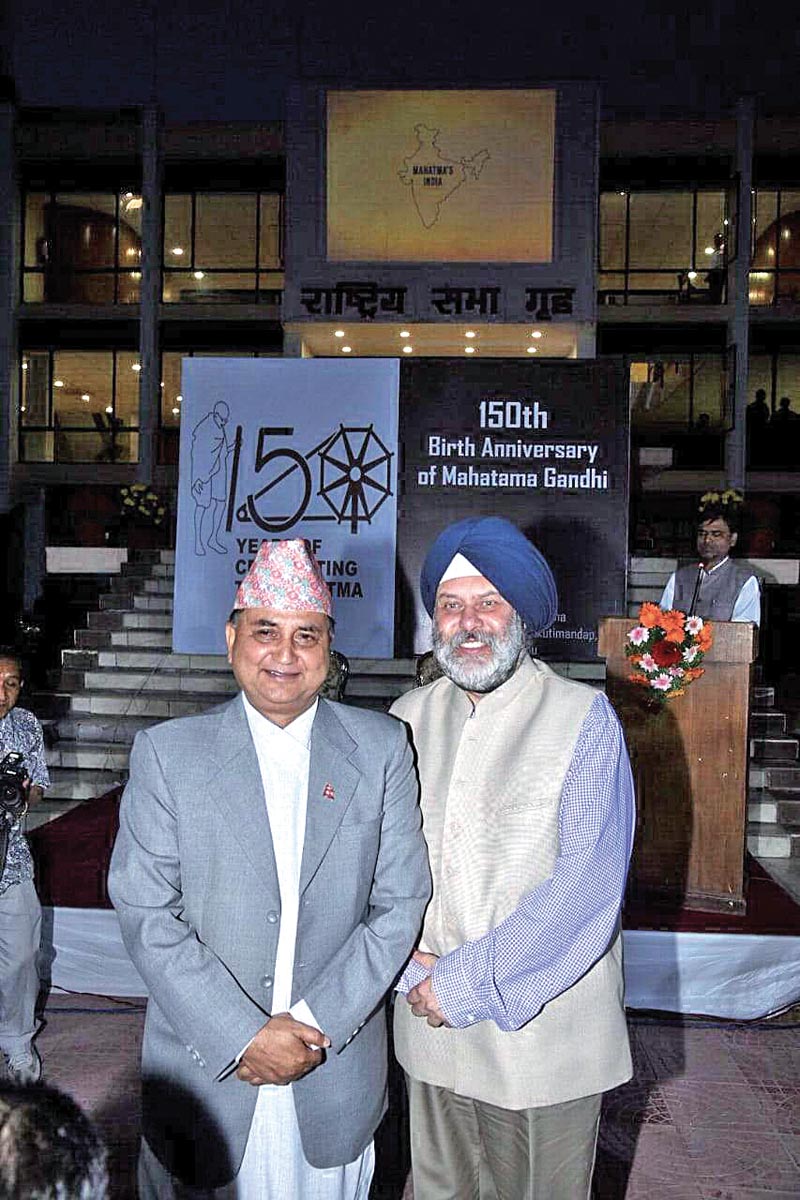‘Entire humanity can benefit from Mahatma Gandhi’s teachings’
Kathmandu, October 2
Former prime minister and Nepali Congress President Sher Bahadur Deuba today said that Mahatma Gandhi’s teachings of non-violent and peaceful method of protest were true and the entire humanity would benefit from those teachings.
Addressing an interaction organised by Mahendra Narayan Nidhi Memorial Foundation on ‘Democracy in the 21st century and Gandhi, to mark the 150th Gandhi Jayanti, Deuba said changes heralded through peaceful and non-violent method as taught by Gandhi could be long lasting. He said Nepal’s popular movements of 1990 and 2006 were also based on Gandhian teachings. “Peaceful methods may take time to yield desired results, but they certainly bring the desired results,” he said and added that Gandhi’s success in overthrowing the most powerful British regime was no mean feat.
Vice-president of Nepali Congress Bimalendra Nidhi said Gandhi’s non-violent protest against the colonial rule in India brought ‘tsunami’ of people’s support against the British rule. “An armed struggle lacks wider support of people,” he said and added that in 1960 when the first NC government was toppled by the king, people did not revolt against the king’s autocratic move, because in 1950 the NC had also overthrown Ranas on the basis of gun.
Nidhi said changes brought in Nepal through peaceful methods would have lasting impact as peaceful protests had linked large sections of society with the democratic movement. He said Gandhi’s teaching that means should be fair to achieve a noble goal was true for all humanity.
NC leader Pradip Giri, a Gandhian, said Gandhi’s main teaching was that human beings should courageously fight for their right and dignity without fearing their rulers no matter how mighty the rulers were.
Giri said fascism was raising its head in some parts of the world and the only effective weapon to tackle such danger was to spread Gandhi’s teachings of treating all human beings equally with dignity. Giri said Gandhi was a great visionary when he said that human beings should not excessively use natural resources. “Unbridled consumerism seems to spell disaster for human beings. Gandhi’s teachings can save us from the risk of unbridled consumerism,” he added.
India’s Bharatiya Janata Party leader Tarun Vijay said he was honoured to attend Gandhi’s 150th Jayanti in Nepal which was his punya bhumi (sacred land) and dharma bhumi (land of pilgrimage).
Gandhi’s main teaching, he said, was that even if one person remained poor and exploited, then the state power became meaningless. He said British rulers not only imposed their rule on India but also suppressed Indian languages, but Nepal kept Gandhi’s legacy alive by protecting its own language particularly the Devanagri script. Vijay said Nepal’s legendary leader BP Koirala, who had joined the Quit India movement and who was jailed along with Rajendra Prasad, earned admiration of Indian people.
Indian National Congress’ National Secretary Chandan Kumar said Gandhi believed that everybody’s demands could not be fulfilled, but everybody should have a chance to be heard by the government and the government should always negotiate with the stakeholders to address their grievances.
He said if governments followed Gandhi’s teachings and tried to protect the rights of all citizens and ensure social justice, then that could help strengthen democracy. He said India’s father of the nation was popular for his teachings not only in India but all over the world, including Nepal.
India’s Ambassador to Nepal Manjeev Singh Puri said Gandhi was the greatest Indian leader to steer the movement of independence and finally win the struggle. He said Gandhi’s great contribution was also known for societal change and transformation in Indian society, including the empowerment of marginalised communities.
Speakers also remembered Nepal’s social reformer Tulasi Mehar Shrestha, who had met Gandhi in 1923 and had tried to spread his teachings in Nepal.






